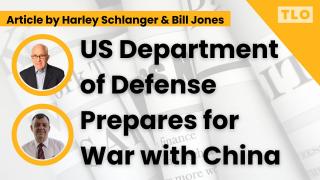by: Harley Schlanger and Bill Jones
According to an article in the {Washington Post} on March 29, a memo written by U.S. Defense Secretary Pete Hegseth has called for the United States to prepare to fight a war against China, with an invasion of Taiwan as the "exclusive animating scenario that must be prioritized." The memo identifies the Trump administration's primary strategic concern as a potential invasion of Taiwan by the armed forces of the People's Republic of China, which it says can be deterred by a readiness to fight a war. Such "readiness" can be demonstrated by a military buildup in the region and closer coordination with regional allies. As the memo was circulating, Hegseth travelled to the Philippines and Japan, to coordinate an overall reorientation of U.S. forces with allies in the Indo-Pacific region.
The memo, titled "Interim National Defense Strategic Guidance", has been in circulation since mid-March. Its theme is coherent with the intent of the Trump administration to use the normalization of relations with Russia to end U.S. involvement in the war in Ukraine, freeing it to focus on the "threat" from China. Hegseth wrote that while “China is the Department’s sole pacing threat," along with the "denial of a Chinese fait accompli seizure of Taiwan," while defending the U.S. homeland "is the Department’s sole pacing scenario,” implying that military containment of China is the ultimate key to American security.
CHINA MOVES FROM "RIVAL" TO "ADVERSARY"
This conforms with a shift on China policy, which occurred under President Obama, before Donald Trump's first term. In January 2016, the Hoover Institution, a prominent neocon think tank, released a report, "China's Ascendance to the Position of Chief Adversary." The subject was that China's growing economic power made it a greater threat than Russia, which Hoover's analysts believed was in a state of decline. This was typical of many similar excretions from neocon think tanks, hysterically warning of the threat from China.
The National Defense Authorization Act of 2017, signed into law by Obama as he was leaving the White House, included language for the first time specifying "military exchanges between senior officers and officials of the U.S. and Taiwan." This was hailed as an "opportunity" to upgrade military relations with Taiwan under President Trump, to allow improved coordination between the U.S. and Taiwan. That same year, "Destined for War: Can America and China Escape Thucydides's Trap?" by political scientist Graham Allison was published, raising again the issue of whether China was a rival or an adversary.
A more definitive answer to this was given in the National Defense Strategy paper produced by the Trump administration in January 2018. In this report, China was described as a "strategic competitor using predatory economics to intimidate its neighbors while militarizing features in the South China Sea."
Over the next years, under both Trump and Biden, leading U.S. military officials repeatedly spoke of the need to upgrade the preparedness for war with China. For example, 4-star General Mike Minihan warned in January 2023, "My gut tells me we will fight [China] in 2025." Minihan was the chief of the U.S. Air Force's Air Mobility Command.
Hegseth had also taken the extraordinary measure of abolishing the Office of Net Assessments, which served since 1973 as an internal Pentagon think-tank looking at the long-term “threats” over the coming 30-40 years, primarily from the Soviet Union/Russia, and has served as the bastion of Russophobia and Sinophobia in the department. The Pentagon indicated that the department would be rebuilt to focus it on “the most pressing national security challenges,” i.e. the PRC.
The campaign against China is by no means limited to the Pentagon, but is a whole of government effort by the Administration. China hawk, Marco Rubio, at State has already indicated that changes were at hand. The most recent State Department Fact Sheet on China replaces a previous reference to Washington not supporting Taiwan independence with the bland comment noting that the United States opposes “unilateral changes to the status quo” by either side of the Taiwan Strait. Taiwan is now designated Taiwan rather than using its previous designation, the Republic of China, while the People’s Republic of China is now referred to simply as China. The Fact Sheet also eliminated a statement that the U.S. would help China on cultural and environmental issues, replacing it with complaints about China’s unfairness on trade.
Asked to comment on Hegseth's memo, Helga Zepp-LaRouche of the Schiller Institute confirmed that this is "a continuation of the same policy, to declare China the prime adversary of the United States. Which is completely ludicrous.... I think this is absolutely terrible, because we’re sitting on a time-bomb with Iran; if... you add the conflict with Ukraine [which] is not yet settled, and if you now add the crisis with China, this could blow up bigtime. The minimum it will do, in the short term, is to absolutely increase an arms race, both in terms of conventional weapons, nuclear weapons, space weapons, which I think can only lead to a catastrophe."
She concluded by calling on her audience to join with the nations of the Global South to take to the streets to mobilize for adoption of a new security and development architecture, and an end to the practice of geopolitics, which produces such delusions as those underlying Hegseth's memo.






